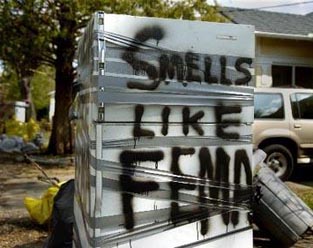A Confederacy of Dunces
 Times-Picayune Photo/Ellis Lucia. In the Uptown area refrigerators and freezers waiting to be taken to the dump are pallets for social commentary, Thursday, October 20, 2005.
Times-Picayune Photo/Ellis Lucia. In the Uptown area refrigerators and freezers waiting to be taken to the dump are pallets for social commentary, Thursday, October 20, 2005.From the Times-Picayune article "FEMA was warned, official says: Agency employee contradicts ex-director":
Bahamonde said that although Katrina represented a "systematic failure of all levels of government," some FEMA employees, along with the Coast Guard and National Guard, performed heroically. There would have been no food at all for evacuees in the Superdome after Aug. 30 if the Coast Guard had not taken a helicopter to a FEMA staging area, landed nearby, then used knives to cut through boxes of MREs and water to airlift them to the Superdome, he said....
On Aug. 31, he had e-mailed Brown from the Superdome to tell him that thousands of evacuees were gathering in the streets outside the Ernest N. Morial Convention Center without food or water and that there were "estimates that many will die within hours." "Sir, I know that you know the situation is past critical," he wrote.
But less than three hours later, Brown's press secretary said in an e-mail that "it is very important that time is allowed for Mr. Brown to eat dinner" at a Baton Rouge restaurant that night before appearing on an MSNBC talk show. "We now have traffic to encounter . . . followed by wait service from the restaurant staff, eating, etc.," the e-mail said.
"OH MY GOD!!!!!!!!" Bahamonde wrote in an apparently hastily written response to a colleague at FEMA after the message was shared with him. "Just tell her (the press secretary) that I just ate an MRE and crapped in the hallway of the Superdome along with 30,000 other close friends so I understand her concern about busy retaurants. Maybe tonight I will have time to move the pebbles on the parking garage floor so they don't stab me in the back while I try to sleep."
______
Today's Examiner's gossip column gushes over Patrick Cassidy, appearing in the musical "Joseph and the Amazing Technicolor Dreamcoat" at the Warner Theatre. He says something that I really relate to: "'I'm a real worker. I come to rehearsal so overprepared. I have my temperamental moments. I have a real problem with ignorance with people not fixing things that are going wrong. If I throw a fit, it's about that.'"
Yesterday's Washington Times has a column by Jonah Goldberg, a writer for the National Review, that comments on the travails of the Bush administration, making the distinction between conservatives that are anti-state (government) vs. those that are anti-left (anti-leftists aren't against government run schools, but they don't want kids to learn about "lesbianism" or evolution [my words, not Goldberg's).
I don't think Goldberg's analysis is close enough. There are anti-left conservatives, but where are the true "anti-government" conservatives? I see anti-social welfare conservatives, but plenty of conservatives happy for a big government that favors big institutions (no estate tax, oil drilling in the Arctic, anti-affirmative action, big contracts for companies like Halliburton, maintaining access to cheap oil in the Middle East through war and other means, etc.).
In What’s the Matter with Kansas? How Conservatives Won the Heart of America, author Thomas Frank discusses how the Republican path to political victory was made by appealing to the average voter's social conservatism, while using the political power gained to favor policies for the wealthy and gigantic (big isn't a big enough word to describe the scale of large busienss today). Conservatives don't seem to be anti-state as much as they are anti-state-helping of those that are less fortunate. (See this article about the book from the Texas Observer.)



0 Comments:
Post a Comment
<< Home